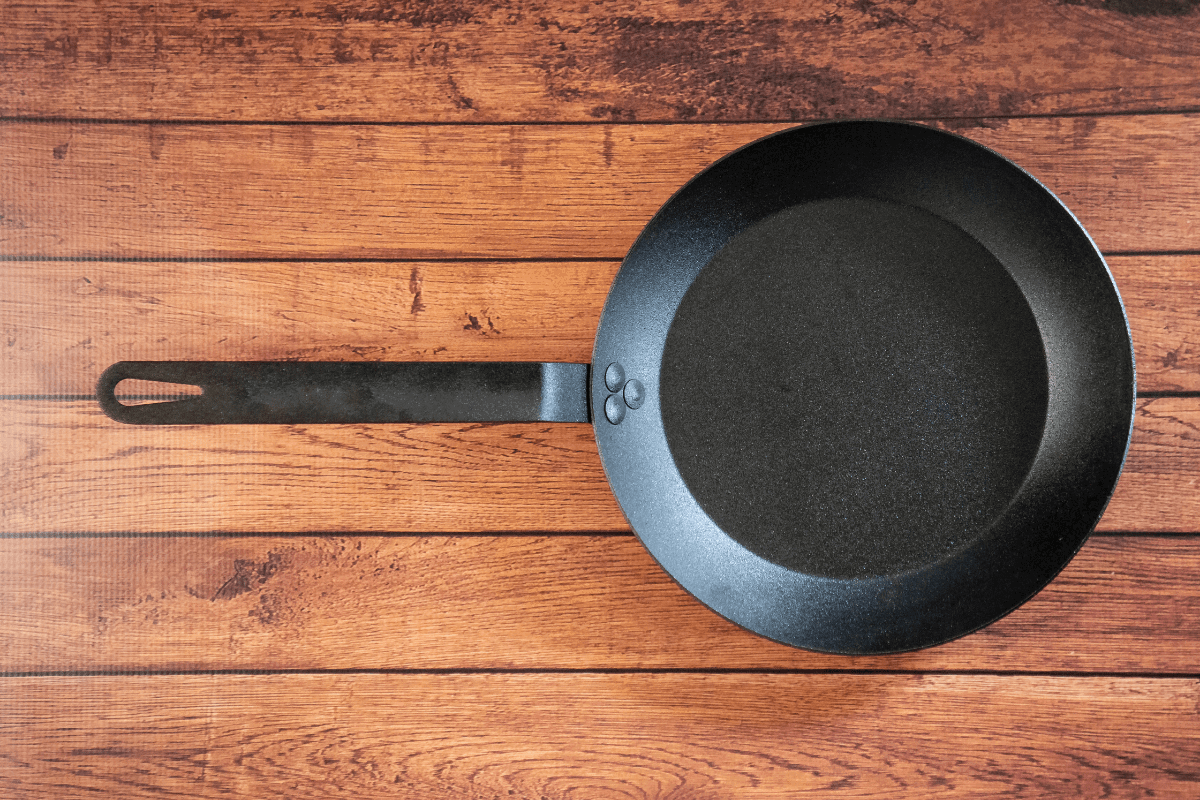Coconut oil’s rich tropical flavor has made its way into all sorts of modern recipes. While its unique flavor isn’t easy to replicate, every option on this list can be used as a 1:1 replacement. Making it a cinch to substitute.
As a professional pastry chef and former cook, I’ve experimented with almost every oil and fat imaginable. So whether you’re cooking or baking, this list will guide you to the best coconut oil substitute for your recipe.
In This Article
1. Butter

This dairy-based classic is a great substitute for coconut oil in baked goods and as a spread. And when it comes to pie crusts, there’s nothing better than butter.
Butter has a lot of flavor and the added benefit of being able to brown and caramelize when cooked. This gives a caramel-type flavor that can take your baked items from pretty good to stellar.
Another advantage of butter in baking is that it creams better than coconut oil. This makes for lighter cookies and cakes.
Vegans and lactose-intolerant cooks will avoid this substitution due to its dairy content. It’s also high in fat, and some consider it less healthy than coconut oil.
2. Ghee

Ghee, or clarified butter, is a scrumptious coconut oil substitute for cooking and roasting. It originated in India and has a sweet, rich taste. Try it instead of coconut oil in a “bulletproof” coffee recipe to start your day.
Ghee is like butter but with all of the milk solids removed, which gives it an incredibly long shelf life. If made correctly, it can last for years!
You can buy it in jars, or you can find recipes online to make it at home easily.
Ghee has a higher smoke point than butter at 485°F, so it can handle high-heat cooking like roasting and pan-frying.
For people with sluggish digestion, ghee may be more difficult to digest than coconut oil. This is due to its concentrated fat content. It’s also best avoided by vegans and people with dairy allergies.
3. Vegan Margarine

Vegetable margarine is a handy substitute for coconut oil in baked goods and as a spread.
These dairy-free butter replacements are usually lower in saturated fat than real butter. They perform much like coconut oil in most recipes, and some blends already contain coconut oil.
There are a few downsides to using vegan margarine in place of coconut oil, however. If you prefer to avoid palm oil for ethical or health reasons, many blends already include it. Some blends also contain hydrogenated fats, so be sure to read the labels if you want to avoid them.
Since each brand contains a blend of oils and fats, performance can vary. In addition, certain blends of vegetable margarine include preservatives or artificial flavors.
My favorite vegan margarine for baking is Earth Balance. But, for spreading on toast, bagels, or biscuits, I can’t get enough of Miyoko’s. It’s cultured like real butter, contains coconut oil, and is free of preservatives.
4. Vegetable Oil

For an easy liquid substitute for coconut oil, vegetable oil gets the job done. It’s useful in cooking, frying, and baking.
This oil is inexpensive and readily available. Its mild flavor and high smoke point make it useful in the kitchen for most tasks.
Unfortunately, vegetable oil is known as one of the least healthy oils out there. This is because it’s usually processed more than single-ingredient oils like olive oil.
5. Olive Oil

This Mediterranean treasure can be a flavorful replacement for coconut oil. It’s ideal for low-heat cooking and dense cakes.
As a bonus, extra virgin olive oil tastes great on its own. Making it perfect for salad dressings and for drizzling on as a finishing oil.
Olive oil has high antioxidant levels and monounsaturated fat content. This makes it a healthy oil to use in place of coconut oil. It even lowers inflammation, in contrast to the vegetable oil mentioned above.
Despite olive oil’s greatest qualities, it’s not ideal for high-heat cooking. It has a low smoke point of 375°F unless you go for a further refined and processed light olive oil.
Its strong flavor also may not be ideal for all baked goods. It can weigh down fluffier products, and for this reason, I only recommend it for dense cakes like pound cakes or banana bread.
6. Sunflower Oil

This liquid substitute from pressed sunflower seeds is best in baking recipes. However, it also holds its own as a cooking and pan-frying oil.
Thanks to its neutral flavor and light texture, it’s great for all-around use. I like to use sunflower oil in lighter muffin recipes and vegan cornbread.
Another bonus of sunflower oil is that it’s lower in saturated fat than coconut oil.
7. Avocado Oil

One of the richest oils, avocado oil, is a perfect substitute for all your frying and roasting needs.
It’s better than coconut oil for deep-frying due to its higher smoke point at 520°F. And its mellow flavor also lends itself well to most any dish.
However, avocado oil may be a less desirable option due to its high price and difficulty finding it in more remote areas.
Another important aspect of avocado oil is that it tends to spoil quickly. So make sure you’re buying it as fresh as possible and using it in a reasonable amount of time.
8. Grapeseed Oil

Grapeseed oil can stand in for coconut oil whether you’re frying, cooking, or baking.
This oil’s super-light texture and mild taste make it versatile. In addition, it has a high smoke point of 420°F, which makes it ideal for pan-frying and deep-frying.
On the downside, the higher price of grapeseed oil may deter some. It can also be hard to find in remote areas.
9. Macadamia Nut Oil

This delectable oil from the macadamia nut is a functional substitute for baking and cooking. It’s also delicious enough to use in salad dressings or as a finishing oil.
Macadamia nut oil has a rich buttery flavor that can taste just as good as coconut oil. And thanks to its high smoke point of 410°F, it works for both pan-frying and deep-frying.
There are a couple downsides to this special oil. Because macadamias come from Hawaii and Australia, this oil can be expensive and hard to find.
10. Applesauce

Applesauce is a popular oil replacement in vegan baking. It can replace coconut oil in baked goods, pancakes, and waffles. It works best if used in conjunction with oils but can be used alone, too.
Baking with applesauce lowers the fat in a recipe and increases the fiber and nutrient content. In addition, it lends a moist texture and a slightly sweet flavor.
This may not be an ideal substitution if you’re on a low-carb diet, as applesauce will add extra carbs and extra sugars to your recipe.
Applesauce can make some recipes a little too wet. You can try straining your applesauce if you’d like to use it at a 1:1 ratio. Otherwise, consider using ½ applesauce and ½ oil to replace coconut oil. You can use it with any of the oils in this list that are good for baking.
11. Peanut Oil

Peanut oil is a coconut oil substitute that shines in stir-fries and breaded, fried foods.
Peanut oil infuses foods with a buttery, nutty flavor. And its high smoke point of 450°F makes it a top pick for deep-frying and pan-frying. Try it for homemade french fries that are out of this world.
As a bonus, it’s an inexpensive oil with a long shelf life.
12. Safflower Oil

Safflower oil is a common oil perfect for cooking, frying, and roasting.
Its light flavor works magic in breaded and fried items. Look for high-linoleic safflower oil to get a higher smoke point of 475°F, which is ideal for deep-frying.
This oil can cost more than plain vegetable oil but shouldn’t cost more than coconut oil. It also may be best if consumed in moderation due to its high omega-6 content.
13. Canola Oil

Canola oil is a readily available oil that works well in place of coconut oil for cooking, frying, and baking.
Since it’s so affordable, it’s a perfect option when making large quantities of food. It also has a medium-high smoke point at 400°F for pan-frying.
While canola oil has some good things going for it, it’s not one of my personal favorites. I find that I can taste it in baking recipes and cold items when it’s used in high amounts.
Tips for Substituting Coconut Oil
When choosing a substitute for coconut oil, a few factors are worth considering. Beyond the basics of price and availability, it’s important to think about flavor.
Butter and olive oil are my top picks for flavor in baked goods and as a spread or drizzle. For frying, avocado and peanut oil are at the top of my list.
Although vegetable oil and canola oil have the least exciting flavors, they’re not all bad. Their versatility and ability to handle high heat can come in handy in a pinch.
Depending on what you’re making, you’ll want to take note of the smoke point of your substitute oil. Unrefined coconut oil has a lower smoke point of 350°F. While the refined version can heat all the way up to 450°F.
So, different substitutes work better for different applications. A crucial point if you’re baking versus frying or roasting.
Frequently Asked Questions
What’s the best substitute for coconut oil in baking?
For creaming ability in cookies, go with butter or vegan margarine. For a liquid substitute, use grapeseed or olive oil.
Can I substitute avocado oil for coconut oil?
Avocado oil is great for frying and roasting in place of coconut oil. It even has a higher smoke point than coconut oil at 520°F.
Can I use vegetable oil instead of coconut oil in a recipe?
Vegetable oil can be used in place of coconut oil for cooking, frying, and baking recipes. It’s easy to find, light in flavor, and affordable.







